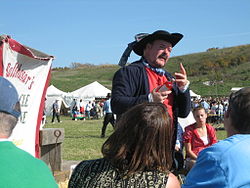- Medicine show
-
Medicine shows were traveling horse and wagon teams which peddled "miracle cure" medications and other products between various entertainment acts. Their precise origins unknown, medicine shows were common in the 19th century United States (though they continued up to World War II). They are most commonly associated with "miracle elixirs" (referred to as snake oil), which, it was claimed, had the ability to cure any disease, smooth wrinkles, remove stains, prolong life or cure any number of common ailments. Entertainment often included a freak show, a flea circus, musical acts, magic tricks, jokes, or storytelling.
Contents
History
Origins
While showmen pitching miraculous cures have been around since classical times,[1] the advent of mixed performance and medicine sales in western culture originated during the Dark Ages of Europe after circuses and theatres were banned and performers had only the marketplace or patrons for support.[1] Medicine shows flourished in the late 19th century, particularly in the midwestern United States and the rural South. They had their origin in the patent medicine vendors who set up booths at local fairs in Colonial America.[2] As early as 1773 laws were being passed against their excesses.[3]
20th Century
The last of these traveling shows was the Hadacol Caravan, sponsored by Louisiana State Senator Dudley J. LeBlanc and his LeBlanc Corporation, makers of the dubious patent medicine/vitamin tonic "Hadacol", known for both its alleged curative powers and its high alcohol content. The stage show, which ran throughout the Deep South in the 1940s with great publicity, featured a number of notable music acts and Hollywood celebrities, and was used to promote Hadacol (which was sold heavily during intermission and after the show). Admission to the show was paid in boxtops of the vitamin tonic, sold in stores throughout the southern United States. The Caravan came to a sudden halt in 1951, when the Hadacol enterprise fell apart in a financial scandal. The swan song for medicine shows came in the summer of 1972 when the two man show of Chief Thundercloud (pitchman Leo Kahdot, a Potawatomi from Oklahoma)[4] and Peg Leg Sam (harmonicist/singer/comedian Arthur Jackson) played at a carnival in Pittsboro, NC. It was the last show of the year for them; Kahdot/Thundercloud died that winter.[5]
Use in popular culture
Several modern musical acts have named themselves after this old-time phenomenon, including Old Crow Medicine Show, Dr. West's Medicine Show & Junk Band, Blues,funk rock band "Moondog Medicine Show -http://www.moondogmedicineshow.com, Dr. Hook & The Medicine Show, and MV & EE Medicine Show. It also lent its name to The Dream Syndicate's album Medicine Show, to Big Audio Dynamite's song "Medicine Show," and The Band's "W.S. Walcott Medicine Show". Throughout 2010, the hip hop artist Madlib released a 12-part mix series (one album each month) with the title "Madlib Medicine Show."
The alternative rock artist Placebo refers to a medicine show in their song "Twenty Years" on the album Once More With Feeling.
Science fiction author Orson Scott Card titled his online sci-fi journal "The Intergalactic Medicine Show".
British comedy trio The Goodies performed a scene as part of "The Goodies Travelling Medicine Show" in an episode of their series entitled Hospital For Hire. The scene included a plant from the audience (Tim) being pulled from the audience to 'prove' that the mystery elixir cured all ailments.
In Rockstar's videogame Red Dead Redemption, one of the main characters plays the role of a early 20th century hustler peddling what John Marston refers to as snake oil.
On the album Everything You Know Is Wrong by the comedy troupe The Firesign Theatre, the recording's narrator plays a wire recording of a medicine show featuring a "Dr. Firesign" promoting "Chief Dancing Knockout's Pyramid Pushover Paste" and "Don Bruhaha's Inca Hell-Oil Tonic".
In The Simpsons episode, "Grampa vs. Sexual Inadequacy," Homer and Grampa Simpsons travel across country, giving medicine shows for their aphrodisiac, "Simpson and Son's Tonic."
Notes
- ^ a b Anderson, Ann (2000) Snake Oil, Hustlers and Hambones: The American Medicine Show McFarland, Jefferson, NC, p. 1, ISBN 0-7864-0800-6
- ^ Young, James Harvey (1961) "Chapter 12: Medicine Show" The Toadstool Millionaires: A social history of patent medicines in America before Federal regulation Princeton University Press, Princeton, N.J., OCLC 405144
- ^ Connecticut passed an anti-mountebank law against those who ensnared people into buying "unwholesome and oftentimes dangerous drugs." Wright, Richardson Little (1927) Hawkers & Walkers of Early America J.B. Lippincott Co., Philadelphia, pp. 199-200, OCLC 1348701; reprinted by Arno Press in 1976, ISBN 0-405-08057-3
- ^ Folklife Center News: Fall 2004 - Volume XXVI , Number 4 (American FolklifeCenter, The Library of Congress). Retrieved 2010-01-22.
- ^ Oxford American - The Southern Magazine of Good Writing. Retrieved 2010-01-22.
Categories:- Entertainment in the United States
- Variety entertainment
- Patent medicines
Wikimedia Foundation. 2010.


